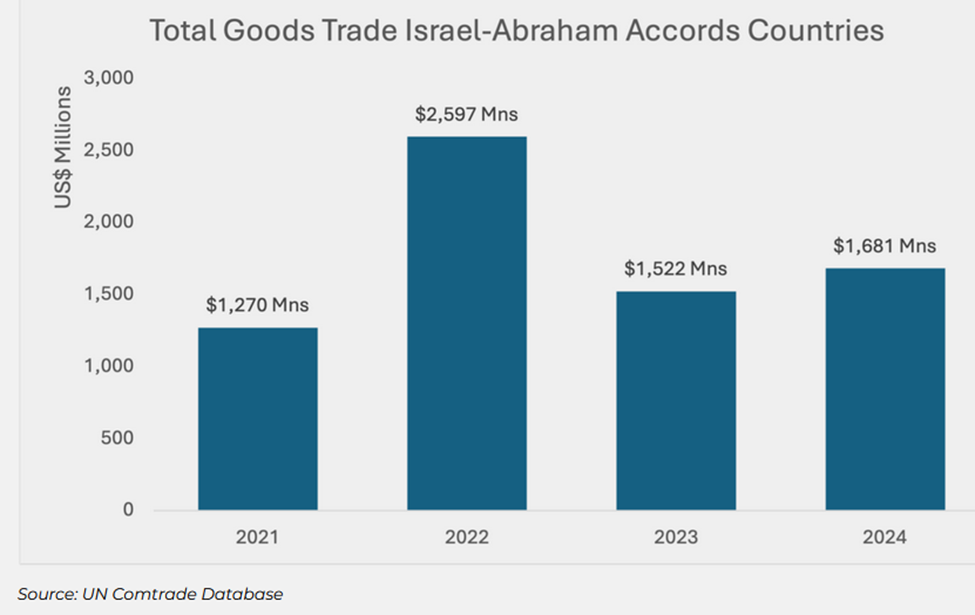September 15, 2025, is the fifth anniversary of the Abraham Accords (Accords) signed by representatives from the nations of Bahrain, Israel, and United Arab Emirates (UAE) that normalized diplomatic and economic ties between the three nations. The United States signed the documents as a witness. Morocco signed the Accords in December 2020.
Trade and tourism between the four nations began and five years later many positive outcomes continue. The United Nations had no part in Accords negotiation, signing, and implementation. This is one item overlooked by many people commenting on the Accords.
Individual agreements were signed between Bahrain and Israel and Israel and the UAE. The Bahrain document is one page long with many trade agreements signed weeks later. The UAE document is seven pages long with specifics in civil aviation, tourism, water, etc.
A separate document was signed by all four nations representatives on September 15, 2025, entitled, “The Abraham Accords Declaration.” The Accords Declaration first three paragraphs state:
The Abraham Accords Declaration: We, the undersigned, recognize the importance of maintaining and strengthening peace in the Middle East and around the world based on mutual understanding and coexistence, as well as respect for human dignity and freedom, including religious freedom.
We encourage efforts to promote interfaith and intercultural dialogue to advance a culture of peace among the three Abrahamic religions and all humanity.
We believe that the best way to address challenges is through cooperation and dialogue and that developing friendly relations among States advances the interests of lasting peace in the Middle East and around the world.
The pursuit of peace by these three Middle Eastern countries broke longtime difficulties on many levels. Peace was made possible when each nation’s leaders chose to put aside their personal and national pride to see the long term benefits of trade and tourism without war.
Each nation opened embassies in the respective countries with new ambassadors. Commercial airline service for business and tourism began between each country. Saudi Arabia allowed Israel commercial airline traffic to traverse their air space thereby reducing travel time between Bahrain and UAE. Medical, university student and technology conferences, and visits began. Imports and exports of products and services were initiated.
A report published on May 27, 2025, by Dubai, UAE-based Observer Research Foundation Middle East entitled, “Assessing Trade within the Abraham Accords” analyzed trade information between the four Accords nations. Trade results are in the bar graph below.

The 2023 total trade dip could be attributed to the Hamas terrorist attack on Israel on October 7, 2023, and its many impacts. The four countries remain in the Accords with embassies operating in each nation and trade and tourism continues. The report continues,
Five years on, the economic outcomes of the accords tell a complex story. While the UAE has leveraged normalisation to establish a robust trade relationship with Israel, Bahrain and Morocco’s economic ties with Israel remain limited, shaped by domestic sensitivities, weak structural alignment, and the absence of formal trade deals.
. . .the United Arab Emirates (UAE) has emerged as Israel’s most engaged economic partner. It has also boasted more agreements, including one akin to a free trade agreement known as the Comprehensive Economic Partnership Agreement (CEPA). While security agreements between Israel and both Morocco and Bahrain have emerged, this has not extended to trade.
Abraham Accords Countries’ Total Trade in Goods with Israel, US Dollars
| Countries | 2021-2024 |
| Bahrain | $50,365,722 |
| Morocco | $575,902,873 |
| UAE | $6,444,352,252 |
Source: the UN Comtrade Database
Israel’s Trade Balance with the Abraham Accords Countries, US Dollars
| Countries | 2021-2024 |
| Bahrain | -$20,689,266.00 |
| Morocco | -$6,600,397.00 |
| UAE | -$2,193,135,994.00 |
Source: the UN Comtrade Database
Four years of trade between Israel and these three Arab Muslim countries is encouraging thanks to the Accords. 2025 media reports other Muslim countries possibly joining the Accords show peace is possible when a nation’s leader and advisors choose to believe and act outside of a historical conflict narrative. The Accords outcome is not utopia, but reflects the best tradeoffs available.


